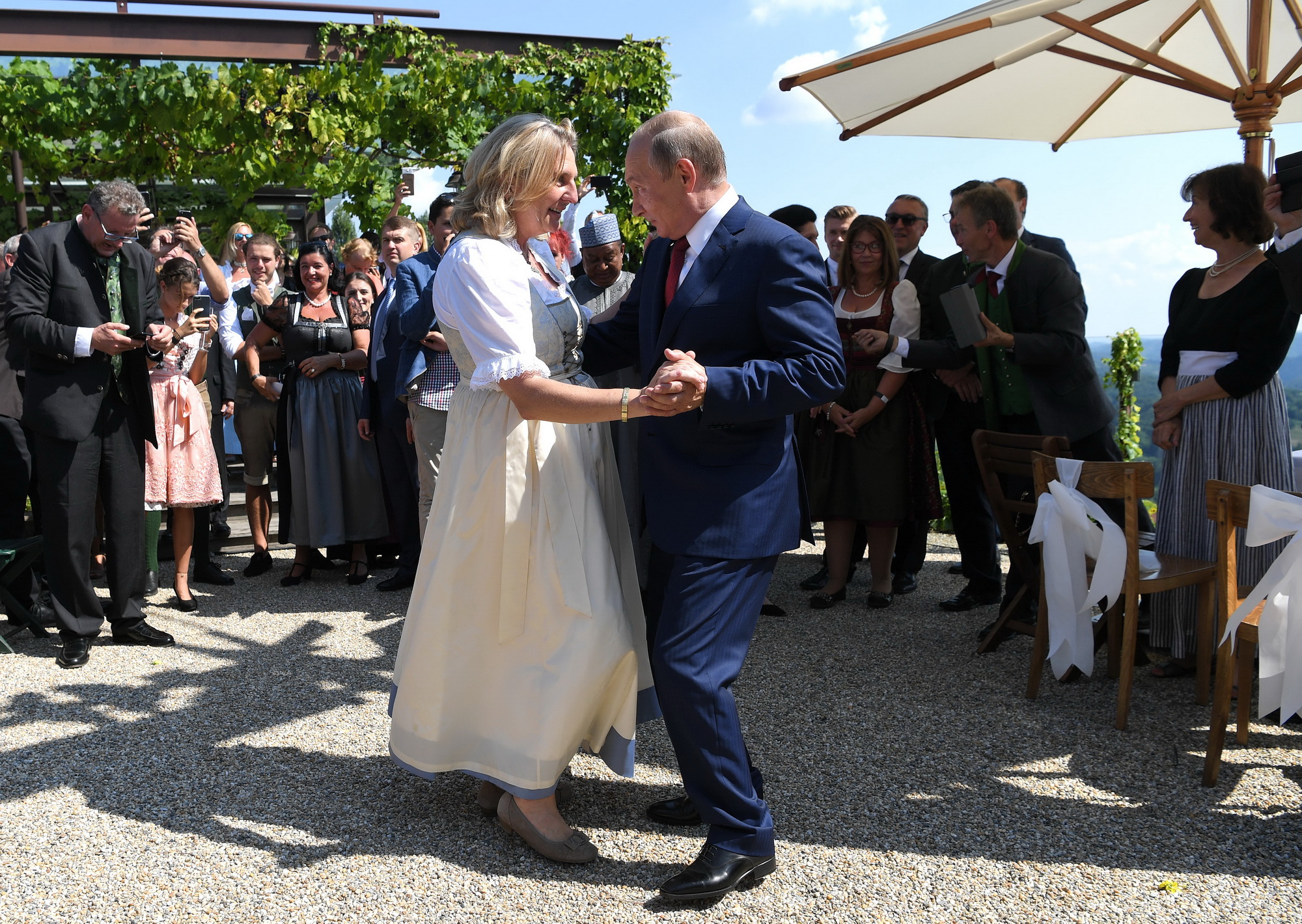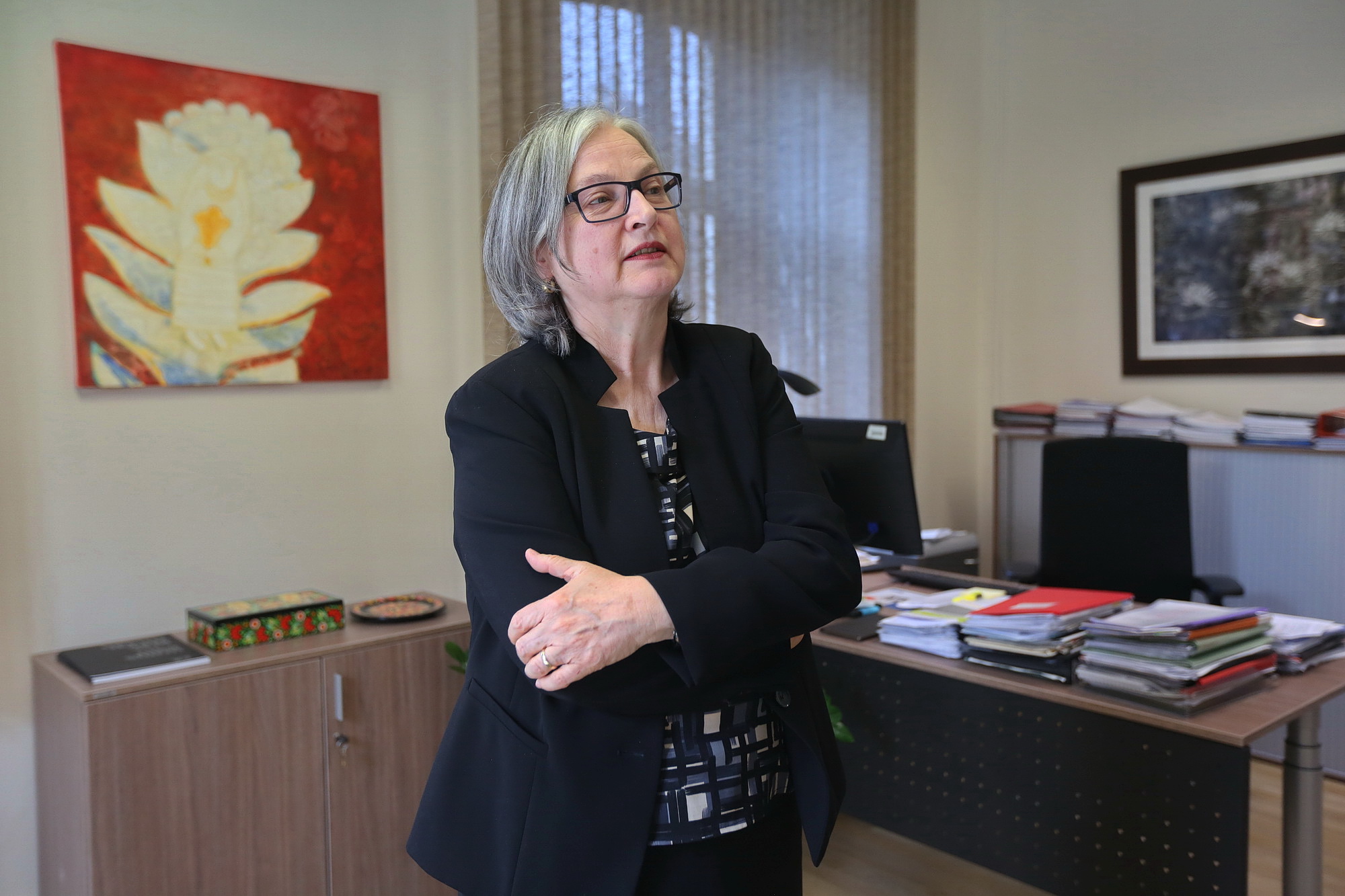Editor’s Note: World in Ukraine takes a look at Ukraine’s bilateral relations with different nations. All articles are written independently from advertisers. To sponsor this news feature, please contact the Kyiv Post’s sales team at advertising@kyivpost.com or call 591-7788.
While 2018 is still here, Austrian Ambassador to Ukraine Hermine Poppeller is already looking ahead to the next year for at least three reasons.
One is that the two nations will celebrate the year of Austrian culture in Ukraine and Ukrainian culture in Austria.
Another is the March 31 presidential election, followed by parliamentary elections in autumn.
If Ukraine can hold a free and fair democratic vote amid Russia’s war and all its other challenges, then Poppeller said its leaders will gain respect among Ukrainians and the nation’s Western partners, including Austria. A successful election will show “democracy is here and cannot be stopped,” she said. “I do hope for a fair and transparent election campaign, and fair and transparent elections.”
And thirdly, 2019 could be Poppeller’s last year in Ukraine. She arrived in 2015, and four years is the normal tour of duty for Austrian ambassadors. She says she has not been told by her Ministry of Foreign Affairs yet when she will leave Ukraine and where she will go.
Beyond those issues, Austria closes out an active year on Dec. 31, holding the rotating presidency of the Council of the European Union in the last six months.
Austria has also been subjected to harsh criticism, in Ukraine and elsewhere, for its attempts to build closer ties with Russia amid the Kremlin’s lawlessness in Syria, where it has violently propped up dictator Bashar al Assad; in Great Britain, where its chemical weapons attack killed a British citizen; and, especially, in Ukraine, where the Kremlin war has killed at least 10,300 people and dismembered the nation.
Austria’s young chancellor, Sebastian Kurz, is criticized as an anti-immigration nationalist who is more comfortable with the likes of Viktor Orban, Hungary’s authoritarian president, than democratic leaders.
Also, Poppeller’s boss, Foreign Minister Karin Kneissl, disgusted people worldwide — and in Ukraine, especially — by first inviting Russian dictator Vladimir Putin to her wed ding in August and then dancing with him in a famous photograph from the event.
Answering the criticisms, Poppeller says that Kurz, and especially Austria, are getting a bad rap on immigration. She said Austria took in the second-largest number of Syrian refugees per capita after Sweden, prompting Austrians to support limits.
As for the wedding dance, Poppeller wouldn’t give her opinion about whether Kneissel made a foolish decision, considering all the people who the Russian president is responsible for murdering. She said few people ask her about the dance because it’s not an important issue.
She compartmentalizes Austrian relations with Ukraine and Russia.
She said Austria supports Ukraine’s territorial integrity and “will never accept” Russia’s illegal annexation of the Crimean peninsula in 2014, the start of the broader Kremlin war. “Nothing has changed,” she said. “We are a supporter of Ukraine.”
The Austrian chancellor, following Russia’s attack on three Ukrainian navy vessels and capture of 24 sailors on Nov. 25, “made a clear statement” that the Kremlin should free the Ukrainian prisoners and return the three Ukrainian vessels that it seized. Moreover, she said Kurz “warned the escalation should not take place” in the seas, and international law must be obeyed.
“Our position to Russia is another issue,” she said. “We think it’s important to have an open channel for discussion if we are talking about solving conflicts without military means. We have to talk and we have to have open channels for those talks.”
She said that once all the “facts are on the table,” then the European Union can discuss whether further economic sanctions against Russia are needed.
What about Firtash?
Poppeller says she has “no idea” when the Austrian Supreme Court will rule on America’s attempt to extradite exiled Ukrainian billionaire oligarch Dmytro Firtash on corruption charges that he denies.
The U. S. has been seeking Firtash’s extradition to stand trial in federal court since his arrest in 2014. But she said that the delays are not unusual for such cases.
Firtash was arrested in Austria on March 12, 2014, at the request of U.S. authorities. He is charged with paying a bribe worth $18.5 million to receive a permit for mining operations in India. Firtash has called the charges false and politically motivated, aimed at limiting his influence in Ukraine.

Austrian Foreign Minister Karin Kneissl and Russian President Vladimir Putin dance during her wedding on August 18, 2018, in Gamlitz, Styria, Austria. (AFP)
Access to war front
She also is watching the war zone in Ukraine, and the effect of a 30-day martial law that President Petro Poroshenko and parliament have imposed until Dec. 26.
Some foreign correspondents have complained about Ukraine’s attempts to restrict access in the eastern Donbas.
“It would be good if they could get access to those areas,” Poppeller said. “If people do not get any news about those areas, how can they know what is going on? As soon as you restrict media cover, there could be suspicions about ‘do we have anything to hide. There are security issues, and I know that Ukraine has to check credentials, but freedom of the press is one of the most important things.
‘Attacks on democracy’
Like many in Ukraine, Poppeller calls the frequency and severity of the attacks on activists throughout Ukraine “an alarming trend.”
She called on Ukraine’s government and law enforcement officials to “do everything to follow up on those cases and catch the perpetrators and bring them to justice.” She called these incidents “attacks against democracy.”
Overall, “reform in the justice sector and fight against corruption is a very difficult issue,” she said. “It is relatively easy to write laws and bring reforms on paper.”

Austrian Ambassador to Ukraine Hermine Poppeller speaks with the Kyiv Post on July 20, 2017 in her office in Kyiv. (Kostyantyn Chernichkin)
The ambassador said that Austria wants the anti-corruption court to start its work in 2019.
“We are all waiting for this court to start working next year which would be a really, really good sign,” she said. “It’s one of the most important things for foreign investors: They would like to be able to defend the case in court. You have to rely on a good court system.”
While Poppeller said “the pace of reforms could be a little bit faster,” Austrian businesspeople in Ukraine report that “things are getting better” in terms of business climate, including reducing bureaucracy, and improved reliability of courts. “A lot of those unnecessary hurdles were taken away already, but there’s still a lot of red tape, but still, it’s getting better and more transparent and easier for investors,” she said. With respect to Austrian businesses working in Ukraine, she said the existing ones are enlarging their investment as the nation’s economy steadily improves (with gross domestic product expected to hit $120 billion, a 3 percent improvement over the previous year, in 2018).
But she has not seen any new and big Austrian investors enter the market.
Austrian presidency
Austria, as one of the European Union’s 28 members, is taking its turn leading the bloc. Its recent stint as rotating president, which ends on Dec. 31, has seen a focus on security issues, including stopping illegal migration and promoting digitalization, and minimizing the losses to both sides from Brexit, the United Kingdom’s coming divorce from the EU next year.
Austria has stressed the importance of improving living conditions in African nations that have been the source of big migration waves. Syrian refugees have also fled dictator Bashar al-Assads assaults on civilians, including with chemical weapons, in suppressing a revolution against his rule.
“Austria, after Sweden, is the country that took in the most immigrants at the height of the Syrian crisis per capita, so you could not say Austria is anti-immigration,” she said. “What we have to have is orderly immigration … The image of Austria as being hostile to immigrants is simply not true.”
Cultural plans in 2019
The year saw two top-level meetings between the two nations. Ukrainian President Petro Poroshenko hosted his Austrian counterpart, Alexander Van der Bellen, for a three-day official visit in March. And then in September, Poroshenko hosted Kurz. They proclaimed at a news conference following their meeting that 2019 would be the year of cultural exchanges for both countries.
“Cultural diplomacy is a very reliable and effective tool for the development of relations between our nations, between our countries,” Poroshenko said. “At all levels, we felt very strong support from our Austrian partners.”
Kurz, according to Poroshenko’s official website, said on Sept. 4: “We are very close at the interpersonal level and I am very glad that we were able to agree on a common year of culture that will make the people of Ukraine and Austria closer. Both nations will benefit from this, it will enrich them.”
Poppeller said that the schedule of events is still being worked out, but it will include scientific, artistic, literary and youth exchanges as well as festivals and historical studies.
“We have to support those who try to spread the image of Ukraine as a very creative country,” she said.
She singled out the work of Ukrainian author, Tetiana Maliarchuk, who writes both in Ukrainian and German, and who won the prestigious Ingeborg Bachmann Award in 2018. She lives in Vienna.
The ambassador said that “there are a lot of very good Ukrainian writers,” and expressed hope that the 2019 cultural focus will “reach a lot of people” in both countries.



